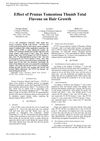 1 citations,
July 2023 in “Cureus”
1 citations,
July 2023 in “Cureus” Cetosomal minoxidil alone and with finasteride is effective and well-tolerated for hair loss treatment.
1 citations,
March 2022 in “Spectrochimica Acta Part A: Molecular and Biomolecular Spectroscopy” A new, quick method detects minoxidil using silver nanoparticles.
 1 citations,
January 2018 in “Springer eBooks”
1 citations,
January 2018 in “Springer eBooks” The document concludes that scalp cooling and treatments like minoxidil can help manage hair loss from cancer therapy.
 August 2024 in “PLoS ONE”
August 2024 in “PLoS ONE” Combining PRP with Minoxidil improves hair density and thickness more than Minoxidil alone.
 August 2024 in “Archives of Dermatological Research”
August 2024 in “Archives of Dermatological Research” Combining botulinum toxin type A with Minoxidil significantly improves hair growth and patient satisfaction in male hair loss.
 May 2024 in “Chemical engineering journal”
May 2024 in “Chemical engineering journal” New treatment using Minoxidil and EGCG with ionic liquids improves hair growth and quality for hair loss.
 February 2024 in “Journal of Molecular Structure”
February 2024 in “Journal of Molecular Structure” The new minoxidil and salicylic acid hydrogel improves alopecia treatment.
 December 2023 in “Azerbaijan Pharmaceutical and Pharmacotherapy J”
December 2023 in “Azerbaijan Pharmaceutical and Pharmacotherapy J” The minoxidil gel could be a better treatment for hair loss than traditional forms.
 December 2023 in “Annales Pharmaceutiques Françaises”
December 2023 in “Annales Pharmaceutiques Françaises” The UV–Vis Spectrophotometry method effectively measures minoxidil in rat skin for alopecia treatment.
 November 2023 in “Current Dermatology Reports”
November 2023 in “Current Dermatology Reports” Oral minoxidil is effective for various hair loss types and may improve male sexual function, but aspirin can reduce its effectiveness.

Cetosomal minoxidil is safer and as effective as alcohol-based minoxidil for male hair loss treatment.
 January 2023 in “Brazilian Journal of Pharmaceutical Sciences”
January 2023 in “Brazilian Journal of Pharmaceutical Sciences” A method was found to accurately measure spironolactone and canrenone in blood samples using liquid chromatography-mass spectrometry.

Prunus Tomentosa extract is effective in promoting hair growth, similar to minoxidil.
 June 2008 in “British Journal of Dermatology”
June 2008 in “British Journal of Dermatology” Herpes gestationis is linked to certain antigens, atopic eczema affects T cell populations and may be eased by breastfeeding, higher doses of anti-androgen treatment can improve androgenic alopecia, topical minoxidil increases hair thickness, long-term methotrexate therapy can cause liver fibrosis in psoriasis patients, and Lichen Sclerosus et Atrophicus patients aren't at higher risk for autoimmune disorders.
March 2021 in “Juniper Online Journal Material Science” Energy healing treatment improved L-cysteine's stability, solubility, bioavailability, and shelf-life.
December 2022 in “Scientia Pharmaceutica” PRP is more effective than minoxidil and placebo for treating hair loss.
December 2022 in “Clinical and experimental dermatology and therapies” Adding the topical gel improved hair growth more than using minoxidil or finasteride alone.
 118 citations,
April 1998 in “Dermatologic Clinics”
118 citations,
April 1998 in “Dermatologic Clinics” Finasteride and minoxidil are effective for hair regrowth, while treatments for alopecia areata have varying success and continuous treatment is necessary.
 98 citations,
May 2008 in “Archives of Dermatological Research”
98 citations,
May 2008 in “Archives of Dermatological Research” Eclipta alba extract helps hair grow faster and more effectively than minoxidil in rats.
 67 citations,
May 2007 in “Journal of Cosmetic Dermatology”
67 citations,
May 2007 in “Journal of Cosmetic Dermatology” The herbal formulation promoted hair growth faster and more effectively than minoxidil in rats.
 54 citations,
May 2018 in “Journal of The European Academy of Dermatology and Venereology”
54 citations,
May 2018 in “Journal of The European Academy of Dermatology and Venereology” Low level laser therapy works best for hair loss, followed by PRP, finasteride, and minoxidil.
 50 citations,
March 2000 in “American Journal of Clinical Dermatology”
50 citations,
March 2000 in “American Journal of Clinical Dermatology” Alopecia Areata has no guaranteed treatment for hair regrowth, but options like corticosteroids and minoxidil are used, with future research focusing on genetic and immune therapies.
 49 citations,
February 2019 in “The Journal of Clinical Endocrinology and Metabolism”
49 citations,
February 2019 in “The Journal of Clinical Endocrinology and Metabolism” Use "female pattern hair loss" term, assess androgen excess, treat with minoxidil and other medications if needed.
 40 citations,
July 2008 in “Drug Discovery Today”
40 citations,
July 2008 in “Drug Discovery Today” Current treatments for male pattern baldness include minoxidil and finasteride, with new options being developed.
 36 citations,
February 2017 in “BMC Complementary and Alternative Medicine”
36 citations,
February 2017 in “BMC Complementary and Alternative Medicine” Geranium sibiricum extract helps hair grow and is more effective than minoxidil but can be toxic in high concentrations.
 30 citations,
January 2000 in “Dermatologic Clinics”
30 citations,
January 2000 in “Dermatologic Clinics” Finasteride and minoxidil are effective FDA-approved treatments for androgenetic alopecia.
 29 citations,
December 1998 in “Seminars in Cutaneous Medicine and Surgery”
29 citations,
December 1998 in “Seminars in Cutaneous Medicine and Surgery” New treatments for hair loss show promise, especially finasteride for men and a stronger minoxidil formula.
 19 citations,
September 2020 in “Pharmaceutics”
19 citations,
September 2020 in “Pharmaceutics” Sodium Valproate nanospanlastics could be a safe and effective treatment for Androgenic Alopecia, with fewer side effects than minoxidil.
 19 citations,
January 2010 in “International Journal of Ayurveda Research”
19 citations,
January 2010 in “International Journal of Ayurveda Research” Tectona grandis Linn. seeds extract improved hair growth in mice better than minoxidil.
 16 citations,
January 2012 in “Asian pacific Journal of Tropical Biomedicine”
16 citations,
January 2012 in “Asian pacific Journal of Tropical Biomedicine” The herbal cream was found to be a safe and effective alternative for hair growth, similar to minoxidil.

























